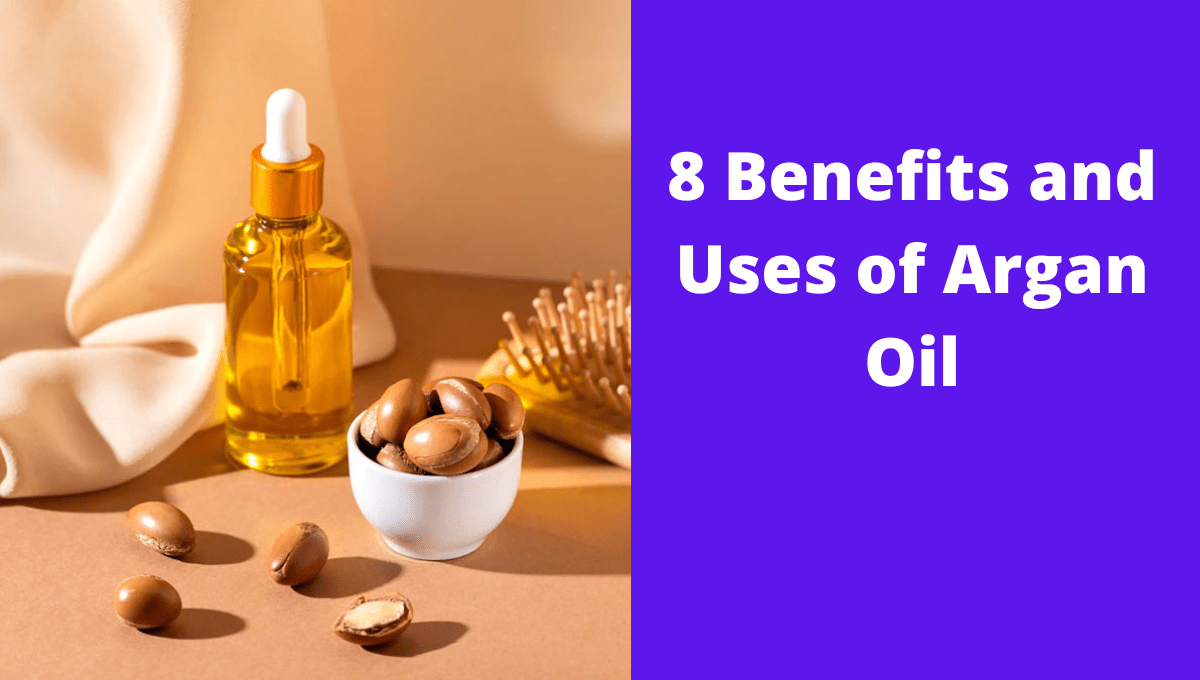Moroccan cuisine has relied on argan oil for generations because of its plethora of possible health advantages as well as its delicate, nutty flavour.
The kernels of the argan tree’s fruit are where this naturally occurring plant oil is obtained from.
Despite being a Moroccan native, argan oil is currently utilized all over the world for a range of culinary, cosmetic, and therapeutic purposes.
The top 13 uses for argan oil and health benefits are covered in this article.
Table of Contents
8 Benefits and Uses of Argan Oil
Natural oil known as argan oil is derived from the kernels of the Argania spinosa tree, a Moroccan native. Argan oil is frequently used in skincare as an anti-aging treatment since it is rich in fatty acids and antioxidants.
In addition to being used in cooking, argan oil is thought to provide health benefits, including the management of diabetes and high blood pressure.
1. Contains Essential Nutrients
Fatty acids and a number of phenolic compounds make up the majority of argan oil’s chemical composition.
Oleic and linoleic acids make up the majority of the fat in argan oil.
Linoleic acid, also known as omega-6, makes up about 29–36% of the fatty acids in argan oil, making it a strong source of this nutrient.
Additionally, vitamin E, which is necessary for healthy skin, hair, and eyes, is abundant in argan oil. Additionally, this vitamin has strong antioxidant capabilities.
2. May Boost Heart Health
Oleic acid, an omega-9 monounsaturated lipid, is abundant in argan oil.
Oleic acid is also found in a number of other foods, such as avocados and olive oils, and it is frequently said to have heart-protective properties.
One small human investigation found that the ability of argan oil to lower the risk of heart disease by altering antioxidant levels in the blood was comparable to that of olive oil.
A larger intake of argan oil was linked to lower levels of “bad” LDL cholesterol and higher blood levels of antioxidants in another small human investigation.
3. May Have Anticancer Effects
Certain cancer cells’ growth and reproduction may be slowed by argan oil.
Prostate cancer cells were treated with polyphenolic components from argan oil in one test-tube investigation. In comparison to the control group, the extract significantly reduced the development of cancer cells (by 50%).
A pharmaceutical-grade blend of vitamin E and argan oil boosted the rate of cell death on breast and colon cancer cell samples in another test-tube investigation.
4. May Reduce Signs of Skin Aging
Many skin care products now contain the increasingly popular argan oil as an ingredient.
According to some research, eating argan oil may slow down ageing by lowering oxidative stress and inflammation.
When used directly to your skin, it may also help the maintenance and restoration of healthy skin, thereby minimising outward signs of ageing.
5. Boost Hair Shine
Argan oil absorbs quickly into the hair strand, unlike other oils like coconut and olive oil, so unless you use too much of it, it won’t leave a greasy residue.
It helps restore gloss and lustre to the hair without weighing it down or generating buildup because of its high fatty acid content.
Before style, add a few drops to wet hair. Apply a little bit to dry hair, paying special attention to the ends.
6. May Promote Wound Healing
Argan oil may hasten the healing of wounds.
One experiment on animals showed that applying argan oil twice daily for 14 days to rats with second-degree burns significantly accelerated the healing of the wounds.
Despite the fact that nothing in this data can be said to be definitive, it does point to a potential role for argan oil in tissue repair and wound healing.
7. Encourage Hair Growth
Argan oil helps support the creation of new hair because it contains phenols, which are particularly stimulating to the scalp.
Combining these advantages with a hair loss remedy is the most effective approach to achieve them. Additionally, you should massage the oil into your scalp each day for a few minutes to open the pores and promote blood flow.
8. Sometimes Used to Treat Acne
Argan oil is marketed as an excellent acne treatment, but there isn’t any solid scientific evidence to back this up.
However, the antioxidant and anti-inflammatory properties of argan oil may help to lessen the skin’s redness and irritation brought on by acne.
The oil may also help to hydrate the skin, which is crucial for avoiding acne.
Conclusion
For ages, people have utilised argan oil for a range of culinary, cosmetic, and therapeutic uses.
It is abundant in anti-inflammatory, antioxidant, and vital elements.
Early studies suggest that argan oil may aid in the prevention of chronic diseases like cancer, diabetes, and heart disease. It might also be used to treat various skin diseases.
Even though the effectiveness of argan oil in treating any of these ailments cannot be proven at this time, many users report positive outcomes.
If you’re interested in argan oil, you may easily find some and use it right away.
